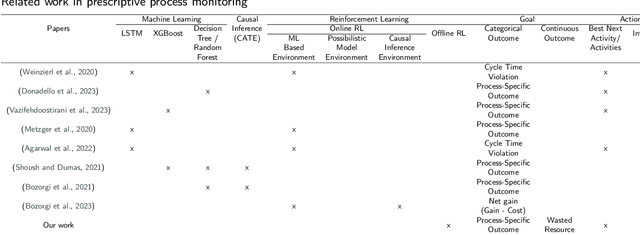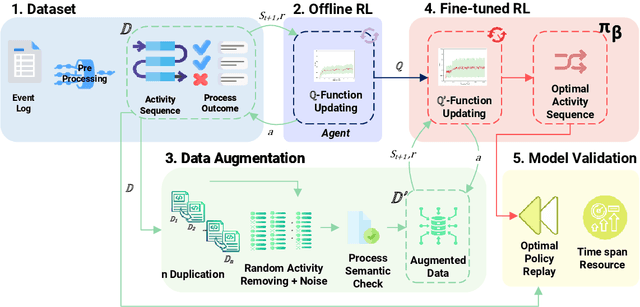Patricia Lasserre
FORLAPS: An Innovative Data-Driven Reinforcement Learning Approach for Prescriptive Process Monitoring
Jan 17, 2025



Abstract:We present a novel 5-step framework called Fine-Tuned Offline Reinforcement Learning Augmented Process Sequence Optimization (FORLAPS), which aims to identify optimal execution paths in business processes using reinforcement learning. We implemented this approach on real-life event logs from our case study an energy regulator in Canada and other real-life event logs, demonstrating the feasibility of the proposed method. Additionally, to compare FORLAPS with the existing models (Permutation Feature Importance and multi-task LSTM-Based model), we experimented to evaluate its effectiveness in terms of resource savings and process time span reduction. The experimental results on real-life event log validate that FORLAPS achieves 31% savings in resource time spent and a 23% reduction in process time span. Using this innovative data augmentation technique, we propose a fine-tuned reinforcement learning approach that aims to automatically fine-tune the model by selectively increasing the average estimated Q-value in the sampled batches. The results show that we obtained a 44% performance improvement compared to the pre-trained model. This study introduces an innovative evaluation model, benchmarking its performance against earlier works using nine publicly available datasets. Robustness is ensured through experiments utilizing the Damerau-Levenshtein distance as the primary metric. In addition, we discussed the suitability of datasets, taking into account their inherent properties, to evaluate the performance of different models. The proposed model, FORLAPS, demonstrated exceptional performance, outperforming existing state-of-the-art approaches in suggesting the most optimal policies or predicting the best next activities within a process trace.
Conformal-in-the-Loop for Learning with Imbalanced Noisy Data
Nov 04, 2024Abstract:Class imbalance and label noise are pervasive in large-scale datasets, yet much of machine learning research assumes well-labeled, balanced data, which rarely reflects real world conditions. Existing approaches typically address either label noise or class imbalance in isolation, leading to suboptimal results when both issues coexist. In this work, we propose Conformal-in-the-Loop (CitL), a novel training framework that addresses both challenges with a conformal prediction-based approach. CitL evaluates sample uncertainty to adjust weights and prune unreliable examples, enhancing model resilience and accuracy with minimal computational cost. Our extensive experiments include a detailed analysis showing how CitL effectively emphasizes impactful data in noisy, imbalanced datasets. Our results show that CitL consistently boosts model performance, achieving up to a 6.1% increase in classification accuracy and a 5.0 mIoU improvement in segmentation. Our code is publicly available: CitL.
 Add to Chrome
Add to Chrome Add to Firefox
Add to Firefox Add to Edge
Add to Edge